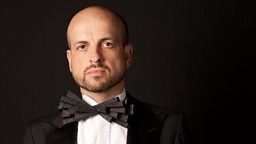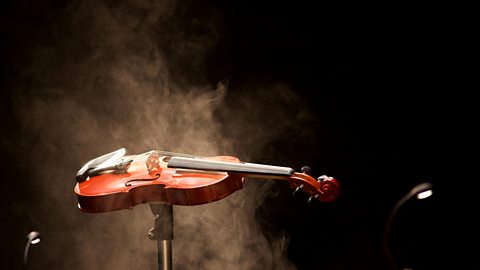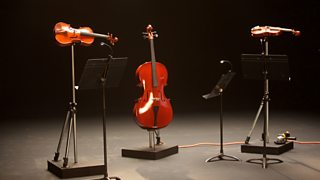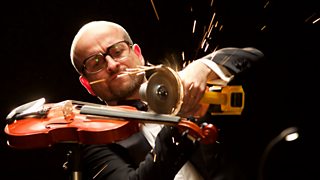Matthew Herbert: Sound Pioneer
The composer-producer on the importance of sound, the future of composition, and why he destroyed a string quartet for Radio 3.

This is about a revolution in music that has happened in my lifetime
In the past, if you wanted to write a piece of music about a house, you'd have to emulate how you felt about it. Now, you can record walking through the front door and turn that into a piece of music. You used to need instruments to play music, but now you can play anything. It's like the shift in art from using pencil and paper to using a video camera.
That's a profound revolution in what music can be. I wanted to create a piece of music that made that shift explicit somehow.
Radio 3’s film is a 30-second version of my 30-minute piece, Requiem
The piece begins with an ensemble playing Beethoven’s last string quartet. About ten minutes in, one of the strings breaks, followed by another – but they carry on playing.
Eventually the musicians begin to trigger samples of the sounds of their own instruments being destroyed. By the end, they’re still playing Beethoven, but what we're hearing is the sounds of their instruments on fire.

Matthew Herbert: Requiem
Beethoven’s last string quartet pushed to breaking point.
I had never sawed through a violin before, so I didn't know what that sounded like until I did it
Like any work, this piece is just a series of questions. People might not like some of the answers. I might not like some of the answers either. And some people will always think you shouldn't ask certain questions: that's the nature of tradition and change.

But some of the answers will be interesting and exciting. I'm interested in hearing new things and in trying to hear and understand the world differently.
Composers today inherit power with their microphones
We can make music out of a Sports Direct warehouse or from the aerial bombardment of Aleppo. Music can be made out Donald Trump’s presidential campaign or some lemons in your local shop. There's no limit to what and where you can record, so it immediately becomes about what stories you want to tell.
The story here is that while you can make extraordinarily beautiful noises from two violins, a viola and a cello, that might not be the most exciting texture or sound that we can be hearing in 2016. In terms of originality, I might be more interested in hearing what happens if somebody rides a bike over a cello.
If Beethoven were alive today, he’d be working on a computer
I can't imagine that Beethoven – or Shostakovich, or Stravinsky or Mozart – would be writing string quartets now. Historically, the most crucial aspect of composition has been control. Beethoven had control over the notes he wrote on the page, but his control over the net effect of the music was negligible, unless he was playing or conducting it himself. And after he died, all he left is a guide.
Now, when I have an idea in the recording studio, I can immediately record it, and that recording becomes the definitive version. I'm in control of everything: the microphone and where it is, how long the musical phrase is, the EQ, the reverb... I've even got control over the music’s title, how it’s released, the artwork and any video element.

Technology gives us extraordinary powers of manipulation over form and texture and musical materials. So the idea that a composer like Beethoven would still just be interested in what musical instruments can do is unlikely.
Predicting how composers will work in the future is like asking Beethoven to describe dubstep
It’s impossible. There are so many evolutionary stages, some subtle, some enormous, that you just can't make any kind of prediction.
But I've nailed my colours to the mast of sound. What's exciting for me is the combination of hearing new sounds and the fact that new technology allows us to listen on a colossal scale. That’s a huge gift to music: everything is possible.




